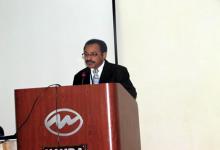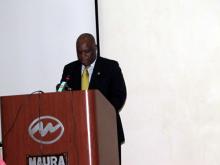Third East Africa Conference on Alcohol calling for ACTION NOW! in Arusha, 24-25th September, 2012
The Government of United Republic of Tanzania on 24th–25th September, 2012, hosted the Third East Africa Conference on Alcohol in Arusha drawing participants from the five East African countries i.e. Burundi, Kenya, Rwanda, Uganda and Tanzania and others from Malawi, South Sudan, Norway and Sweden.
The Conference themed Alcohol is a problem: Act Now! was organized by the IOGT-NTO Movement International Institute, which is a Swedish Temperance Organization that aims to contribute to a world free from the harmful consequences of alcohol and other drugs. The conference was officially opened by the Deputy Minister for Health and Social Welfare, Hon. Seif Rashid (MP).
Others present at the conference were; the Swedish Ambassador, Mr. Lennarth Hjelmaker, the WHO Representative, Dr. Rufaro Chatora; Ministry of Health officials, members of parliament and other participants from the participating countries, IOGT officials, WCO staff, Representatives of CSOs, Alcohol Policy Alliances, Representatives from Research Institutions and the media.
In his opening speech, the Deputy Minister for Health and Social Welfare, Hon. Seif Rashid reiterated on the need for the represented countries to develop and implement evidence based alcohol policies as an effective approach to reduce harmful use of alcohol. Similar sentiments were echoed by the Swedish Ambassador, Mr. Lennarth Hjelmaker.
The WHO Country Representative, Dr. Rufaro Chatora, in his speech, highlighted the rising burden of public health problems related to consumption of alcohol in the African Region. He also reiterated the five key principles which should guide policy development as follows:
- Policies should be based on best available evidence and be sensitive to national contexts.
- Citizens, especially those at risk, should be protected from alcohol-related harm, particularly harm from other people’s act of drinking, and from pressures to drink.
- Strong political commitment, leadership and appropriate funding will ensure that effective approaches to alcohol problems are formulated, taking into account public health principles.
- Actions should be undertaken in a coordinated, strategic and integrated manner jointly with key agencies and with appropriate involvement of all partners and stakeholders at all stages of decision-making, planning, implementation and evaluation.
- Equitable and non-stigmatized access to effective prevention and care services should be given to all individuals and families; human rights should be respected.
He then went on to elaborate on the priority interventions for national action including:
- Leadership, coordination and partners’ mobilization.
- Awareness and community action.
- Information-based public education.
- Improvement of health sector response.
- Strategic information, surveillance and research.
- Enforcing drink-driving legislation and countermeasures.
- Regulating alcohol marketing.
- Addressing accessibility, availability and affordability of alcohol.
- Addressing illegal and informal production of alcohol.
- Resource mobilization, appropriate allocation and integrated approach.
The conference proceeded with presentations from the participating countries reflecting and sharing experiences on issues relating to the development and implementation of Alcohol Policies. The presentations and discussions provided an opportunity for the countries to update each other on progress made towards control of harmful use of alcohol, since the last Conference held in 2010.
The conference then agreed on the following recommendations for countries:
- Countries must Act Now!
- Conduct extensive research to ascertain the magnitude of harmful use of alcohol to inform policy formulation
- Conduct stakeholder mapping and analysis exercise
- Develop comprehensive alcohol policy
- Use media effectively to increase public awareness
Third East Africa Conference on Alcohol calling for ACTION NOW! in Arusha, 24-25th September, 2012


